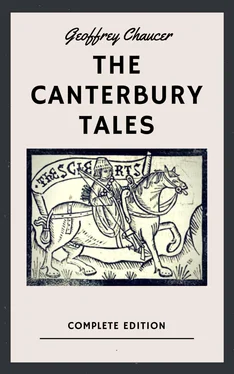That down he went, and cried," Harow! I die."
These clerkes beat him well, and let him lie,
And greithen* them, and take their horse anon, *make ready, dress
And eke their meal, and on their way they gon:
And at the mill door eke they took their cake
Of half a bushel flour, full well y-bake.
Thus is the proude miller well y-beat,
And hath y-lost the grinding of the wheat;
And payed for the supper *every deal* *every bit
Of Alein and of John, that beat him well;
His wife is swived, and his daughter als*; *also
Lo, such it is a miller to be false.
And therefore this proverb is said full sooth,
"*Him thar not winnen well* that evil do'th, *he deserves not to gain*
A guiler shall himself beguiled be:"
And God that sitteth high in majesty
Save all this Company, both great and smale.
Thus have I quit* the Miller in my tale. *made myself quits with
Notes to the Reeve's Tale
1. The incidents of this tale were much relished in the Middle Ages, and are found under various forms. Boccaccio has told them in the ninth day of his "Decameron".
2. Camuse: flat; French "camuse", snub-nosed.
3. Gite: gown or coat; French "jupe."
4. Soler Hall: the hall or college at Cambridge with the gallery or upper storey; supposed to have been Clare Hall. (Transcribers note: later commentators identify it with King's Hall, now merged with Trinity College)
5. Manciple: steward; provisioner of the hall. See also note 47 to the prologue to the Tales.
6. Testif: headstrong, wild-brained; French, "entete."
7. Strother: Tyrwhitt points to Anstruther, in Fife: Mr Wright to the Vale of Langstroth, in the West Riding of Yorkshire. Chaucer has given the scholars a dialect that may have belonged to either district, although it more immediately suggests the more northern of the two. (Transcribers note: later commentators have identified it with a now vanished village near Kirknewton in Northumberland. There was a well-known Alein of Strother in Chaucer's lifetime.)
8. Wanges: grinders, cheek-teeth; Anglo-Saxon, "Wang," the cheek; German, "Wange."
9. See note 1 to the Prologue to the Reeves Tale
10. In the "Cento Novelle Antiche," the story is told of a mule, which pretends that his name is written on the bottom of his hind foot. The wolf attempts to read it, the mule kills him with a kick in the forehead; and the fox, looking on, remarks that "every man of letters is not wise." A similar story is told in "Reynard the Fox."
11. Levesell: an arbour; Anglo-Saxon, "lefe-setl," leafy seat.
12. Noth: business; German, "Noth," necessity.
13. Bathe: both; Scottice, "baith."
14. Capel: horse; Gaelic, "capall;" French, "cheval;" Italian, "cavallo," from Latin, "caballus."
15. Make a clerkes beard: cheat a scholar; French, "faire la barbe;" and Boccaccio uses the proverb in the same sense.
16. "Gar" is Scotch for "cause;" some editions read, however, "get us some".
17. Chalons: blankets, coverlets, made at Chalons in France.
18. Crock: pitcher, cruse; Anglo-Saxon, "crocca;" German, "krug;" hence "crockery."
19. Dwale: night-shade, Solanum somniferum, given to cause sleep.
20. Burdoun: bass; "burden" of a song. It originally means the drone of a bagpipe; French, "bourdon."
21. Compline: even-song in the church service; chorus.
22. Ferly: strange. In Scotland, a "ferlie" is an unwonted or remarkable sight.
23. A furlong way: As long as it might take to walk a furlong.
24. Cockenay: a term of contempt, probably borrowed from the kitchen; a cook, in base Latin, being termed "coquinarius." compare French "coquin," rascal.
25. Unhardy is unsely: the cowardly is unlucky; "nothing venture, nothing have;" German, "unselig," unhappy.
26. Holy cross of Bromeholm: A common adjuration at that time; the cross or rood of the priory of Bromholm, in Norfolk, was said to contain part of the real cross and therefore held in high esteem.
27. In manus tuas: Latin, "in your hands".
THE COOK'S TALE.
THE PROLOGUE.
THE Cook of London, while the Reeve thus spake,
For joy he laugh'd and clapp'd him on the back:
"Aha!" quoth he, "for Christes passion,
This Miller had a sharp conclusion,
Upon this argument of herbergage.* *lodging
Well saide Solomon in his language,
Bring thou not every man into thine house,
For harbouring by night is perilous.
*Well ought a man avised for to be* *a man should take good heed*
Whom that he brought into his privity.
I pray to God to give me sorrow and care
If ever, since I highte* Hodge of Ware, *was called
Heard I a miller better *set a-work*; *handled
He had a jape* of malice in the derk. *trick
But God forbid that we should stinte* here, *stop
And therefore if ye will vouchsafe to hear
A tale of me, that am a poore man,
I will you tell as well as e'er I can
A little jape that fell in our city."
Our Host answer'd and said; "I grant it thee.
Roger, tell on; and look that it be good,
For many a pasty hast thou letten blood,
And many a Jack of Dover<1> hast thou sold,
That had been twice hot and twice cold.
Of many a pilgrim hast thou Christe's curse,
For of thy parsley yet fare they the worse.
That they have eaten in thy stubble goose:
For in thy shop doth many a fly go loose.
Now tell on, gentle Roger, by thy name,
But yet I pray thee be not *wroth for game*; *angry with my jesting*
A man may say full sooth in game and play."
"Thou sayst full sooth," quoth Roger, "by my fay;
But sooth play quad play,<2> as the Fleming saith,
And therefore, Harry Bailly, by thy faith,
Be thou not wroth, else we departe* here, *part company
Though that my tale be of an hostelere.* *innkeeper
But natheless, I will not tell it yet,
But ere we part, y-wis* thou shalt be quit."<3> *assuredly
And therewithal he laugh'd and made cheer,<4>
And told his tale, as ye shall after hear.
Notes to the Prologue to the Cook's Tale
1. Jack of Dover: an article of cookery. (Transcriber's note: suggested by some commentators to be a kind of pie, and by others to be a fish)
2. Sooth play quad play: true jest is no jest.
3. It may be remembered that each pilgrim was bound to tell two stories; one on the way to Canterbury, the other returning.
4. Made cheer: French, "fit bonne mine;" put on a pleasant countenance.
A prentice whilom dwelt in our city,
And of a craft of victuallers was he:
Galliard* he was, as goldfinch in the shaw**, *lively **grove
Brown as a berry, a proper short fellaw:
With lockes black, combed full fetisly.* *daintily
And dance he could so well and jollily,
That he was called Perkin Revellour.
He was as full of love and paramour,
As is the honeycomb of honey sweet;
Well was the wenche that with him might meet.
At every bridal would he sing and hop;
He better lov'd the tavern than the shop.
For when there any riding was in Cheap,<1>
Out of the shoppe thither would he leap,
And, till that he had all the sight y-seen,
And danced well, he would not come again;
And gather'd him a meinie* of his sort, *company of fellows
To hop and sing, and make such disport:
And there they *sette steven* for to meet *made appointment*
To playen at the dice in such a street.
For in the towne was there no prentice
That fairer coulde cast a pair of dice
Than Perkin could; and thereto *he was free *he spent money liberally
Of his dispence, in place of privity.* where he would not be seen*
Читать дальше












